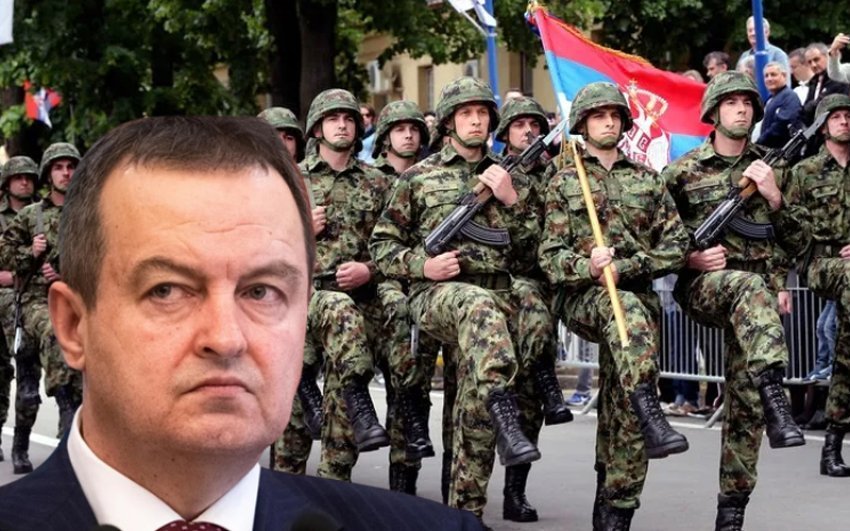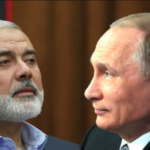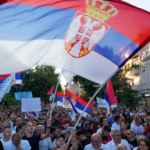Serbia appears to be strategically expanding its influence across the Balkan states. Recently, it has been closely cooperating with North Macedonia.
Serbian Minister of Internal Affairs, Ivica Dačić, after meeting with his counterpart from North Macedonia, Panche Toshkovski, stated that there is an agreement for Serbian police to patrol in North Macedonia and vice versa, starting from August.
Dačić mentioned that this will initially be implemented in Ohrid, due to the high number of tourists from Serbia.
“This is something we have agreed upon, to practically begin from August a practice we have not had until now, which is for a number of our police officers — and we have no objection to this happening here as well — to be present during the summer season where there are our tourists…”
“We have agreed to do this together with North Macedonia, which means that whenever there is a need, in this case during the summer season in Ohrid, but also vice versa, whatever is needed, we are ready to help each other,” emphasized Dačić.
However, on the other hand, there are also arrests of Kosovars who are on Serbia’s wanted lists.
It was the Ministry of Internal Affairs of North Macedonia that confirmed that on July 17th, a Kosovo citizen was arrested based on an arrest warrant issued by Serbia.
“On 17.07.2024, at 16:00, at the Jazhince border crossing, upon entering the state, police officers stopped B.R. (47 years old) from Kosovo because during passport control it was found that he was registered with ‘Apsi’ at the request of Serbia, and he was handed over to the authorities in Tetovo for further actions,” stated the Ministry of Internal Affairs of North Macedonia.
“It was about Blerim Ramadani, a former member of the Nerodime Operational Zone of the Kosovo Liberation Army.”
This cooperation between Serbia and North Macedonia raises questions: Could it pose a risk to the Kosovars that Serbia is seeking to arrest from the last war?
Political Analysts Respond: An Unjustifiable Escalation of Tensions
Political analyst Amir Shabani, who specializes in North Macedonia, deems this concern as unjustified and a deliberate attempt to escalate tensions and uncertainty among citizens. He asserts that such a situation has been occurring for ten consecutive years.
“The emphasis on Serbian police patrolling in North Macedonia comes from the Albanian opposition in the country, using it as a daily political tool, pretending to play the role of a constructive opposition.”
“The truth is, as Deputy Minister Iseni has pointed out, that cooperation in the field of patrolling among police forces in the Western Balkans has been in place since 2014, and this has been happening for ten consecutive years. Therefore, it is senseless to escalate tensions and uncertainty among citizens, as it is not only Serbian police patrolling, but also Montenegrin, Albanian, Bosnian, and Kosovar police,” he declares.
A Dangerous Trend: North Macedonia’s Government Under Scrutiny
Political expert Muhamet Kelmendi, in a response to Bota Sot, stated that the current government of North Macedonia has become a vassal state of Serbia, implying that North Macedonia is increasingly dependent on Serbia.
“With the current Slavonic-nationalistic and chauvinistic government of VMRO, North Macedonia has become a vassal state of Serbia. It’s not just about the Serbian police crossing the border and operating in this state, but also about the relationships in many fields and subjugation.”
“Everywhere, North Macedonia is coming under the influence of Serbia. The Slavo-Macedonians are submitting to Serbia. This marks the beginning of the reoccupation of this region, as part of the plan to realize the Slavo-Serbian world. This world is also desired by the current government of North Macedonia,” he states.
He further claims that Skopje, under the VMRO government, has violated the Ohrid Agreement, adding that now, not only the Kosovars but also the Albanians living in North Macedonia are at risk.
“Skopje, with the VMRO government, has essentially violated the entire Ohrid Agreement. Now it is not only about the threat to Kosovars by capturing and arresting them as in Serbia, but also the threat to the Albanian community in North Macedonia. The non-recognition of the first party of the second-largest ethnic group forming the state, namely DUI, has pushed the state into a subordinate position to Serbia. This has been made even clearer by the acceptance of the non-existent Serbian party in government, appointing a Serb as Deputy Prime Minister. The Ohrid Agreement has been breached.”
Kelmendi advocates for territorial reorganization of North Macedonia, proposing a Belgian or Irish model of governance.
“The Belgian model is a federal model of territorial construction and is much closer and more applicable to this multinational state. I hope that this model will be adopted by DUI and that they will present it to the relevant factors for organizing the state in North Macedonia,” he expresses.
Finally, Kelmendi criticizes this government, stating that this ruling party is allowing Slavo-Macedonians to create conditions that could lead to the state merging with Serbia, and if this happens, it could lead to war.
“It must also be said that the second-largest ethnic coalition does not fully support the implementation of the Ohrid Agreement. This ruling party is allowing the Slavo-Macedonians to create conditions for this state to merge with Serbia. This is unacceptable. No Serbian entity should be allowed to operate in North Macedonia. Allowing this will lead to war. This state is the axis of peace or war in the Balkans. This will ignite the entire Balkans,” he concludes for Bota Sot.
Conclusion
The developments highlighted in this article demand a strong condemnation of Serbia’s expansionist policies and the passive complicity of North Macedonia’s government. These actions threaten not only the sovereignty of Kosovo and the rights of its citizens but also the stability of the entire Balkan region. It is crucial for the international community and regional actors to closely monitor and address these alarming trends, ensuring that peace and justice are upheld.






